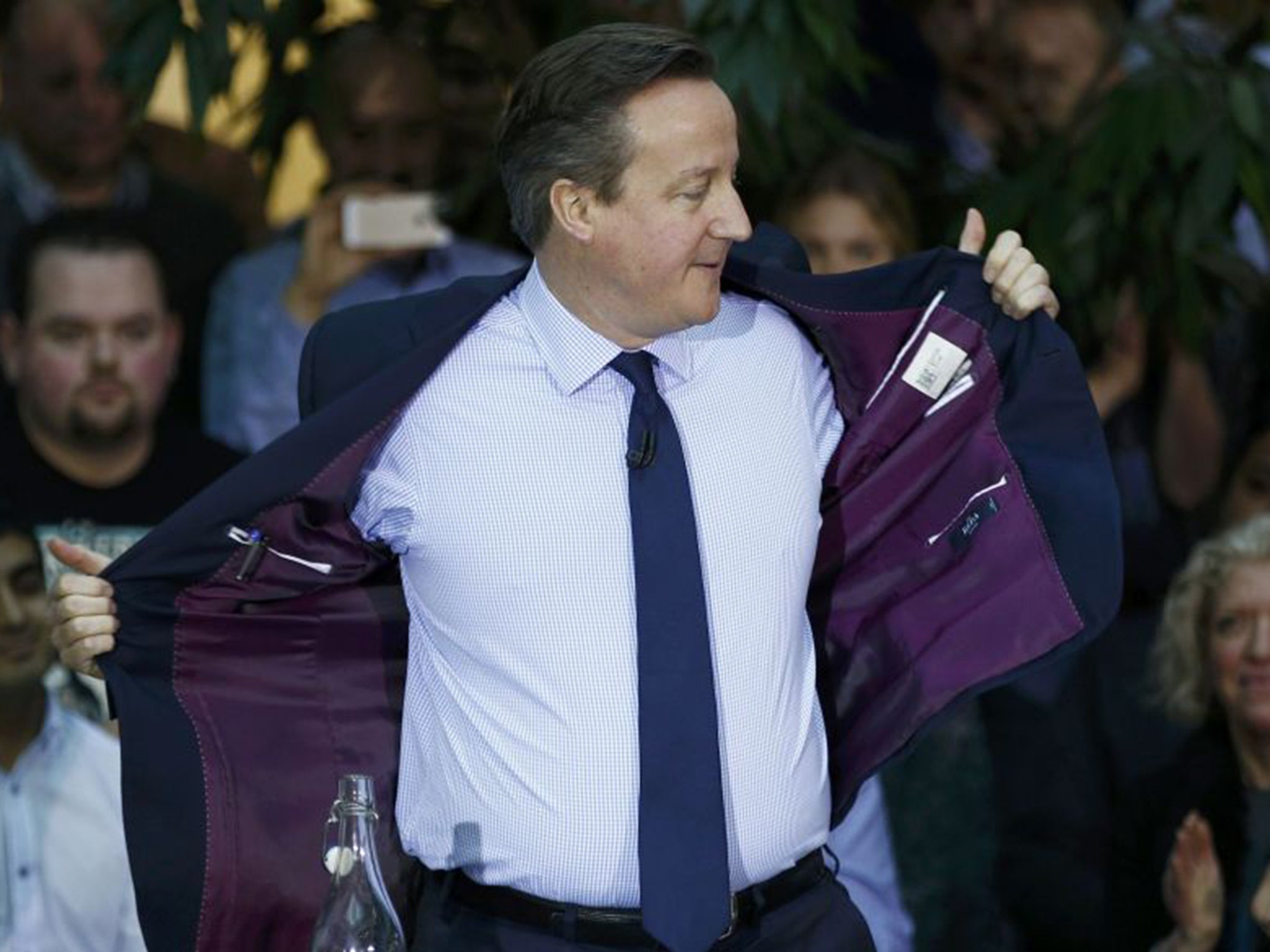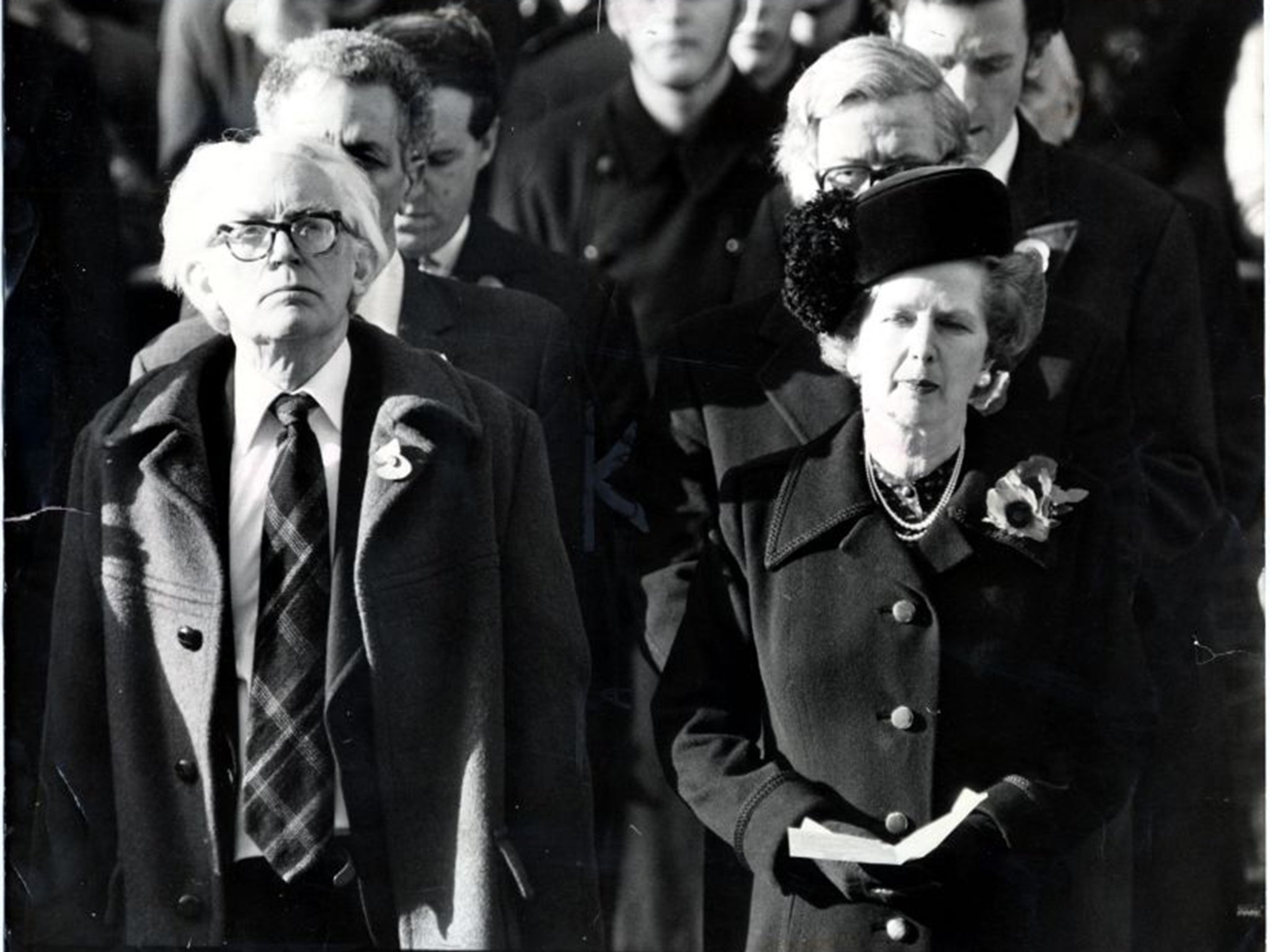Respectability: David Cameron’s put-down of Jeremy Corbyn’s appearance shows the value of that derided virtue
There was a time when wearing of a suit and tie was the most potent symbol of all when it came to assessing a person’s suitability for practically any post

No doubt it’s a mark of the interesting political times we live in that for the second occasion in a fortnight I should have found myself sympathising with a senior member of Her Majesty’s Government. Two weeks ago it was the Chancellor of the Exchequer George Osborne and his embarrassing psychiatrist brother. Last week, it was David Cameron and the Prime Minister’s Questions row with his opposite number, Jeremy Corbyn, on the always problematic subject of maternal advice.
Mr Corbyn, it may be remembered, was in the middle of some representations on the current state of the NHS, and the number of weekend deaths in our hospitals, when the Labour back-bencher Carolyn Harris, doubtless seeking to whip an already volatile situation up to boiling point, whispered the phrase “Ask your mother”.This, as all students of the contemporary political scene will know, was a reference to the appearance of Mary Cameron’s signature on a petition against council cuts in Oxfordshire.
Her son, his voice croaking with what The Independent’s sketch-writer Tom Peck neatly defined as “that rare combination of manufactured outrage and outrageous good fortune”, was naturally incandescent. “I know what my mother would say,” he briskly informed the house, with a withering glance at the denizens of the opposition front bench. “She would look across the dispatch box and say, ‘Put on a proper suit. Do up your tie! And sing the national anthem.’’
For some reason, this mild critique of Mr Corbyn’s personal appearance was regarded as a devastating blow beneath the belt. The Sky News caption mentioned a “new low” in the Cameron-Corbyn relationship. Various Labour MPs assembled to “publicly condemn” what was referred to as a “nasty personal attack”, which rather made one want to assemble a synopsis of the properly nasty personal attacks made in that august chamber over the past half-century and consider how feebly this one shaped up in comparison.

Oddly enough, I found myself entirely on Mr Cameron’s side in this argument, not because I really care how Mr Corbyn arrays himself for his public performances, or what manner of finery he deems appropriate, but because it was a way of expressing a little posthumous solidarity with my father, to whom the wearing of a suit and tie was perhaps the most potent symbol of all when it came to assessing a person’s suitability for practically any post, ranging from the director general-ship of the CBI or the secretary-ship of the local bowls club.
Dad, an electrician’s son from a Norwich council estate, would, I am pretty sure, have been scandalised by Mr Corbyn’s lack of a decent suit, just as he was scandalised by the occasion in 1981 when the then Labour leader Michael Foot appeared at the Cenotaph on Remembrance Sunday clad in what certain newspapers stigmatised as a “donkey jacket”.
The obvious explanation for this hostility towards members of the People’s Party, who arrived on rostrums and in television studios without having dressed themselves up to the nines, is that dad was a Conservative, for whom, in the heat of battle, any ammunition would do, and whose opinions could therefore be discounted. And yet this turns out to be exactly the same attitude expressed by his meter-reading father, an old-fashioned Asquithian Liberal, as far as I can make out, who declined to vote for the Labour Party at the general election of 1935 on the grounds that its tribunes were “a lot of riff-raff”.
Why did my father and his kind dislike Mr Foot and his green jacket (which history records that even the Queen Mother approved and wrote a consoling letter in support of) or the picket-lining trades unionist leaders who wore car coats and caps? The answer is that to working-class men of their generation, suit, collar and tie were a mark of respectability, proof that you counted in a world where large numbers of working-class men were pretty much denied a voice.

Certainly you could overdo the lustre of your personal appearance – dad’s first comment when he saw me in the “interview suit” which most 17-year-olds of the late 1970s acquired for the purposes of university entry, was “What are you doing, all dressed up like a pox-doctor’s clerk?” But the suit was important. It meant that you were taking on the toffs on their terms, that your portrait now hung in a gallery previously reserved for wealth and privilege, that – to expand the range of reference a bit – you were occupying the same territory as the radical Victorian MP John Bright, who when sneered at for his grasp of parliamentary protocol by some languid sprig of the aristocracy is supposed to have replied that he knew the Blue Book as well as his noble lordship.
An old-style Marxist would probably suggest that this obsession with suit-wearing was a classic example of working-class subservience, the lower orders colluding with their betters to oppress themselves and that the first batches of Labour MPs should have turned up at Westminster in bathing suits, the better to annoy their enemies. A social historian would perhaps offer that the wearing of a collar and tie (and the slight snootiness about other working-class people who didn’t) was a mark of snobbery and the age-old adage that petty social distinctions are as important to a council estate as to the toniest garden suburb.
But neither of these interpretations quite conveys the significance of such externals to the early 20th-century working-class concept of “respectability”, and the way in which looking and behaving your best became a part of the person you imagined yourself to be. It would be very easy to write off my grandmother, who pined for a “double-bay front” (one of the very rare inter-war era council houses with two bay windows) and looked down her nose at some of Hodgson Road’s less presentable families, as a snob.
The truth, as Richard Hoggart insists in his classic study of post-war working-class culture, The Uses of Literacy (1957), is more complicated than this, a matter not of despising the neighbouring children who didn’t pass the 11-plus or obtain white-collar jobs but of living up to your own, in some cases deeply exacting standards. Inevitably, none of this inspires a sense of class solidarity, but no historian ever examines the “ordinary” life of the past century and a half without concluding that such a thing barely exists.
And why should it? What, after all, did working-class solidarity ever do for the inhabitants of the Earlham estate? Clearly, 35 years after even Mr Foot’s chief whip complained about his lack of respect at the Cenotaph, the idea of “respectability” is still going strong (significantly enough, Lynsey Hanley has chosen the single word “Respectable” for the title of her forthcoming study of British social class). Equally clearly, the parameters have changed and one is now likely to be judged by a whole range of factors far beyond the old reductive division of “white-collar” and “blue collar”.
Meanwhile, it is a no doubt regrettable fact that large numbers of people in this country – not simply Mrs Cameron and her neatly attired son – still believe that manners and good tailoring maketh the man. All of which, as a loyal but highly disillusioned member of the Labour Party, reinforces my conviction that Tristam Hunt, who looks like one of those Thirties-era adverts for the 40-shilling tailor is just the man to lead us out of the morass.
Join our commenting forum
Join thought-provoking conversations, follow other Independent readers and see their replies
Comments
Bookmark popover
Removed from bookmarks